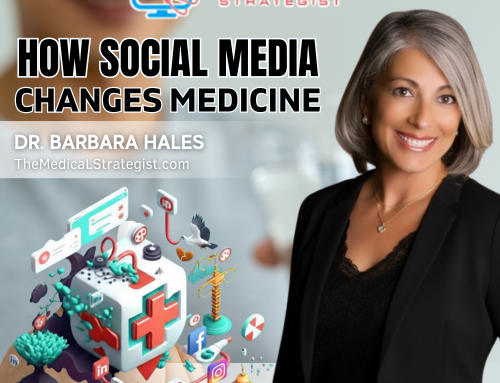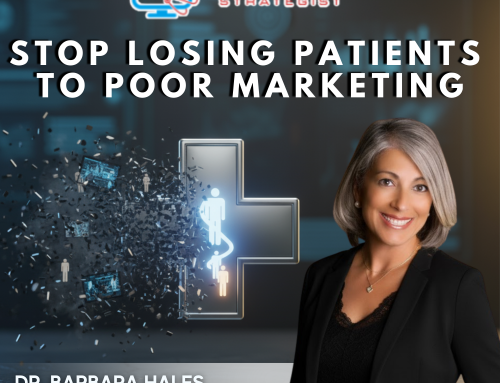Podcast: Play in new window | Download
Subscribe: RSS
In this episode, Dr. Barbara Hales interviews Michelle Dickinson, a TED speaker and best-selling author, about burnout management and resilience training.
- Michelle shares how her approach focuses on practical, non-clinical strategies that help professionals manage stress and prevent burnout before it becomes overwhelming.
• She emphasizes the power of personal agency, self-awareness, and micro-habits to build resilience.
• One of the most impactful strategies she highlights is creating a simple morning routine to set a positive tone for the day.
• Michelle discusses her organic journey to finding her ideal audience, starting with educators, and how she expanded her outreach.
• She shares marketing insights, stressing the importance of authentic connection, networking, and visibility through social media, public speaking, and community involvement.
Key Takeaway:
“Burnout prevention isn’t about waiting for circumstances to change—it’s about reclaiming your personal agency and making small, consistent choices that lead to lasting resilience.” – Michelle Dickinson
Connect with Michelle Dickinson:
• Website: resilienceasalifestyle.com
• LinkedIn: Michelle E. Dickinson
Connect with Barbara Hales:
Twitter: @DrBarbaraHales
Facebook: facebook.com/theMedicalStrategist
Business website: www.TheMedicalStrategist.com
Show website: www.MarketingTipsForDoctors.com
Email: info@TheMedicalStrategist.com
YouTube: TheMedicalStrategist
LinkedIn: www.linkedin.com/in/barbarahales
Books:
Content Copy Made Easy
14 Tactics to Triple Sales
Power to the Patient: The Medical Strategist
TRANSCRIPTION (189)
Introduction
Dr. Barbara Hales: Welcome to another episode of Marketing Tips for Doctors. I’m your host, Dr. Barbara Hales. Today, we have with us Michelle Dickinson. She is flipping the script on stress management as a TED speaker and best-selling author. She has taught over 15,000 people across education, Fortune 500 companies, and healthcare how to actually deal with burnout—not just talk about it.
Michelle doesn’t do typical coaching. She teaches practical skills that work right away, like getting a user manual for your brain. Her clients see real results fast, with a 30% stress reduction in three sessions and a 50-70% reduction after completing her program in six to eight sessions. She helps people handle tough situations without feeling overwhelmed, build daily habits that actually stick, and turn stress into something manageable.
If you’re a doctor recognizing the signs of burnout, let’s take care of it before you feel you need to shut down your practice. Welcome to the show, Michelle!
Michelle Dickinson: Hi, Barbara! Thank you so much for inviting me.
The Growing Problem of Burnout in Healthcare
Dr. Barbara Hales: Burnout is such an important topic, especially in healthcare. With electronic health records, bureaucracy, and federal regulations, many doctors feel overwhelmed. They miss the days when they could focus on patient care without so many administrative hurdles.
Michelle, I heard you mention the word resilience multiple times. What does resilience as a lifestyle mean to you?
Michelle Dickinson: Resilience as a Lifestyle was born from the need to get ahead of burnout and its consequences. It’s not just about recovery—it’s about preventing burnout before it happens. We focus on practical strategies personalized to individuals to help them reclaim their personal agency.
Many people wait for their circumstances to change to feel better, but the truth is, we can take control of how we respond to stress. Our approach incorporates self-awareness, micro-habits, accountability, and even leveraging dopamine to build sustainable resilience.
Michelle’s Personal Journey with Burnout
Dr. Barbara Hales: Did you personally experience burnout? How did you get into this field?
Michelle Dickinson: Absolutely. I spent 19 years in a high-pressure corporate job. Within one week, I lost both my job and my marriage. That was a breaking point for me.
Through therapy, self-awareness training, and resilience programs, I learned how to manage stress effectively. These strategies became the foundation of my work. Over time, I refined them through years of coaching, helping professionals apply them in real-world situations.
The Role of Personal Agency in Stress Management
Dr. Barbara Hales: Many professionals seem to self-sabotage. They feel trapped in an endless cycle of stress. Why does this happen?
Michelle Dickinson: Our society promotes a grind-and-hustle mentality. We’re conditioned to push forward, but we rarely take a moment to pause and assess what we need.
Personal agency is key—when we recognize that we can take control of our daily habits and mindset, we stop waiting for external factors to change. Without this awareness, stress eventually leads to burnout, impacting personal relationships, health, and even career longevity.
Practical Strategies for Burnout Prevention
Dr. Barbara Hales: What’s one effective habit that professionals can start implementing today?
Michelle Dickinson: The most impactful habit we’ve seen through our coaching is starting the day with intention.
Many people fall into their day without a plan, immediately reacting to stressors. But setting aside just 10 minutes each morning for a simple routine—whether it’s deep breathing, journaling, or stretching—can set the tone for the entire day.
It creates a domino effect, leading to more intentional actions and reduced stress over time.
Finding and Connecting with the Right Audience
Dr. Barbara Hales: How did you identify your ideal audience, and what can private practitioners learn from your approach?
Michelle Dickinson: At first, I didn’t have a clear idea of who I was meant to help. I simply followed the energy and engagement.
Our first major audience was educators—not because I specifically targeted them, but because they responded most to our work. From there, we expanded into other high-stress professions like healthcare.
For private practitioners, the key lesson is to be flexible. Listen to who resonates with your work and follow that momentum.
Marketing Strategies to Reach More People
Dr. Barbara Hales: You provide an important service. How do you let people know you’re out there?
Michelle Dickinson: We use a mix of strategies:
- LinkedIn outreach to connect with professionals.
- Podcasts like this one to reach new audiences.
- Email campaigns to stay in touch with potential clients.
- Public speaking at keynotes and convocations.
- Community involvement, like joining the Optimist Club in my town.
The key is visibility—put yourself in places where your audience already is.
The Power of Authentic Connection in Marketing
Dr. Barbara Hales: If a doctor wanted to improve their marketing today, what’s one quick and impactful strategy they could implement immediately?
Michelle Dickinson: Authentic connection is one of the most powerful yet overlooked marketing strategies.
It doesn’t have to be complex—something as simple as meeting someone for coffee, shaking hands at a networking event, or joining a local professional group can make a huge impact.
People want to feel connected, and building trust through in-person interactions leads to the best opportunities.
Overcoming the Stigma Around Burnout
Dr. Barbara Hales: Many professionals, including doctors and educators, hesitate to seek help because they don’t want to be labeled as struggling with emotional issues. How do you address this?
Michelle Dickinson: That’s why our approach is non-clinical.
We don’t diagnose or dive into past traumas. Instead, we provide personalized resilience training, focusing on actionable tools that meet people where they are.
This makes it more approachable—people don’t feel like they’re admitting to a problem; they’re simply learning skills to navigate stress better.
How to Connect with Michelle Dickinson
Dr. Barbara Hales: Thank you for sharing such valuable insights. If listeners want to connect with you, how can they reach you?
Michelle Dickinson: They can visit my website at resilienceasalifestyle.com or connect with me on LinkedIn (Michelle E. Dickinson).
Dr. Barbara Hales: Thank you so much for being on the show, Michelle!
Michelle Dickinson: Thank you for having me, Barbara!



